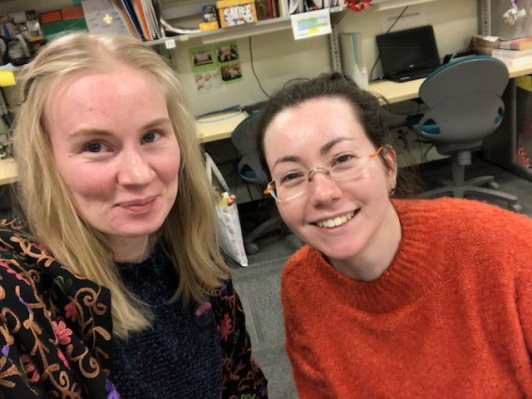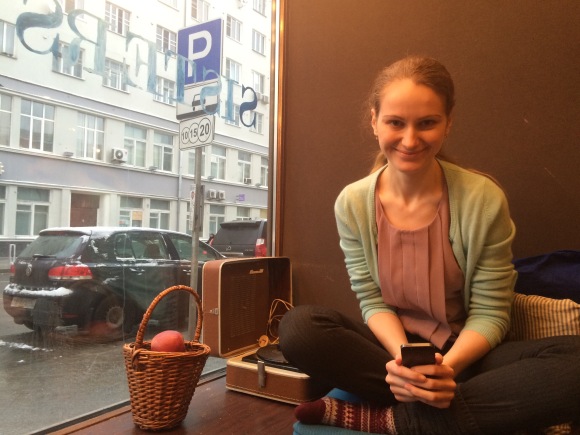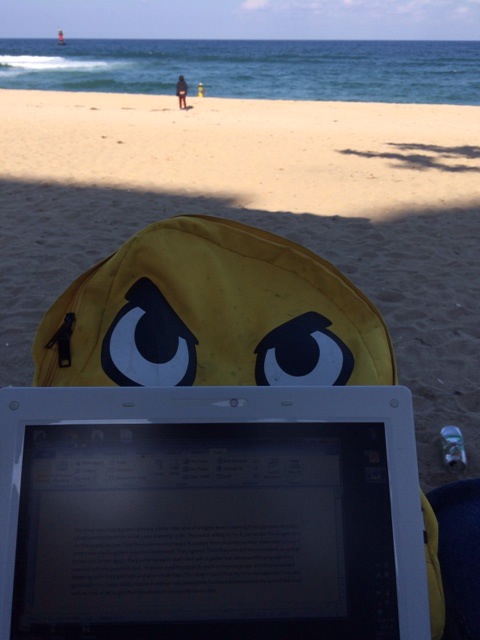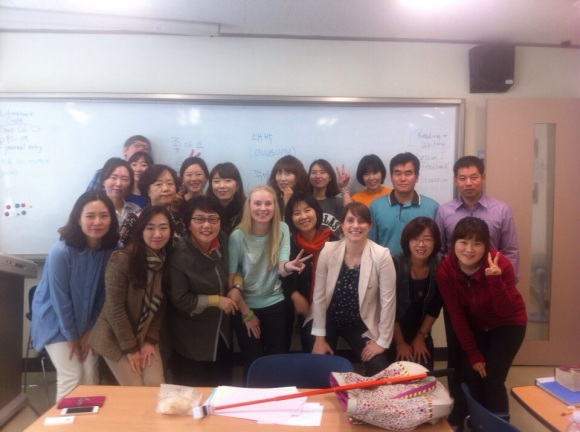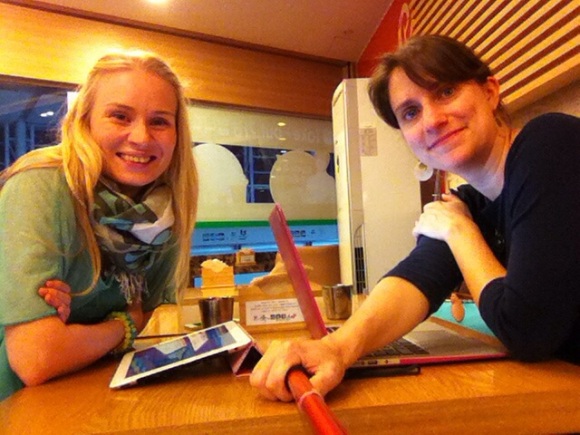Today’s blog post is a reflective practice meeting on paper.
Wait, what?
Let me explain. Here in Tokyo we hold monthly reflective practice meetings (and I mentioned those before in my previous blog posts, for example here). We tell stories and ask questions, trying to help each other look deeper and see more in what happened. Some meetings see more participants than others, some have two. Like today.
And while it wouldn’t be unreasonable to have a chit-chat with Lina and call it a Meeting, we thought we’d do something special. We’d type up what we’d otherwise be saying.
So here goes your Christmas present from RP Tokyo, a reflective conversation around a happy ELT story from a 2017 classroom.
***** PART 1, THE STORY *****
My happy story did not start so cheerfully. In fact, it started as one of the most challenging, trying classes of this fall semester. In a bunch of high level proficiency students, most of whom had either studied or lived abroad, there was one kid who seemed particularly… bored. Let’s call this student Bo.
Bo’s casual English was nearly flawless. I could easily see Bo hang out with his mates in LA, London, Singapore, etc. and have zero problems getting the message across (a possibly timely note: Bo’s “mates” in my imagination would be 16-18 year olds). So back to our classes. From the very first lesson (and mine is a mandatory discussion class that HAS to be taken no matter how fluent and great you are at English), Bo looked like the class was about the worst possible way to spend time (yet, Bo only missed one class out of 11). Bo was the first person to grab the bag and leave the classroom the very moment the bell rang and I wrapped up the lesson. I don’t remember Bo ever saying goodbye to either myself or group mates – and the class size is eight students, so I would most definitely hear those words. In group discussions, Bo liked to sit back in the chair and waited to be asked to share opinion. Which Bo would quickly do – and return to the very comfortable if idle position.
Needless to say I felt not a little annoyed and frustrated by Bo’s attitude. However, that class was a BUNCH, as I said, and it was a bunch of Bo’s and other. Every day I had to teach that class, I mentally prepared myself for a storm of emotions that I might have to go through. One such time it hit me pretty hard and I blogged about it. I didn’t really want to give up on them and all of the various issues I found myself experiencing when teaching this particular group. I tried to do something (or not do something I’d been doing) in class, hoping that a little change would work (for this idea in my mind I will forever thank John Fanselow). Yet it seemed like they could see through my intentional effort – and class went off the rails (for me anyway) in a totally different way again.
Anyway, I did say it is a happy story, and so it is. After our latest lesson I was returning back to my office from another building on campus and I saw Bo, who I’d earlier taught that day. Bo was in a group of friends and engaged in a conversation… but as I was passing by, Bo made sure to say “Goodbye Anna” loud and clear enough for me to hear and react to. Right now as I’m typing this, I’m smiling. Such a tiny thing, you’d think. Coming from Bo, though, in a circumstance like that, it felt pretty great.
I am not sure what had happened and what Bo will be like in the remaining classes we have together this term. I do want to mention something, though. In one of the recent lessons I asked those students to do a self-reflection. Among other tasks, the reflection had these questions:
Apart from our Discussion classes, do you have an opportunity to use English in your life right now? (By “use” I mostly mean speak, but please mention other ways you use it, too). When do you use English? How much (a week)? With whom?
We only have 5 classes left. After that, you won’t have any more Discussion classes. This could be a good time to set a goal to achieve by the end of the course. What goal(s) would you like to set for yourself for Discussion class? What can you do to achieve this goal?
Bo’s answers were eye-opening to me (and who knows, maybe to Bo, too…). Bo said that, having spent many years abroad speaking English every day in an international school, now there is NO chance to use English. Bo’s goal was to participate actively every class and ask group mates lots of questions (I’m obviously not quoting, so I think Bo formulated it even better, and with … mmm… heart put into it). In fact, all students in that class surprised me that time with how thoughtful they were, how genuine their response was, how openly and responsibly they took the questions. They inspired me to be more positive and have good faith in what we can all do together in class. I now don’t fear that class approaching. I like them and I think I will miss them when I have to say goodbye.
I don’t think self-reflection or any other measure I took or didn’t take to turn things around in that particular class worked on its own. Frankly speaking, I’m not even sure how the next class is going to be. But I feel now it’s a happy story already.
***** THE QUESTIONS Lina asked *****
In group discussions, Bo liked to sit back in the chair and waited to be asked to share opinion.
Lina: Why do you think this happened? Bo’s English is almost flawless, as you describe it, so it wouldn’t be difficult for Bo at all to participate in the discussions actively. What could have stopped Bo from doing that? Bo didn’t like being forced to take this class? Bo didn’t like the topics? Bo thought it was too easy?
Anna: I observed Bo, even though I think for the first few weeks my vision was clouded with the frustration I felt about exactly this – having the means to do the thing and participate, and yet not having the desire to do so. I think this is a case when ability and willingness to communicate did not get to meet. For a while. It might have been conditions, or atmosphere, or mood, or class composition, or teenage rebellion… anything, really. Everything.
and class went off the rails (for me anyway) in a totally different way again.
Lina: It would be interesting to hear in what ways the classes went off the rails. In what ways did they ruin your efforts?..
Anna: For example, I have a bad habit of running class a little overtime. It never seemed to be a problem with any other students, but as Bo was always the first to leave abruptly, I felt badly and thought we should finish on time. However, it’s tough as students in this class are overly chatty and I had to spend quite a bit of our time bringing them back to tasks. So that one class I started by offering “a deal” – they’d be paying attention and not getting distracted, I in my turn would be able to finish and let them go on time. I was pretty happy with my idea. Well… they could focus for about 7 minutes… and for the remainder of the lesson, they suddenly decided to chat with each other in Japanese!… In all lessons stages, between speaking tasks, during speaking tasks, in group discussions.. It was something new, and something I couldn’t expect from students of their level of proficiency. It was something else. The deal didn’t work…
Bo’s goal was to participate actively every class and ask group mates lots of questions
Lina: I can’t wait for an update! I really want to get to know if this student achieves the goal or not. Will the usual behaviour change?
Anna: We’ve had two classes since, and it’s been great. Touch wood. =)
I don’t think self-reflection or any other measure I took or didn’t take to turn things around in that particular class worked on its own.
Lina: Do you think you managed to establish a good rapport with these students? Do you feel like they’re a unity now or still just a bunch?
Anna: I feel like we’ve come closer. Not only me and them, but also them with one another. And…. again, I was frustrated that my usual methods of “establishing rapport” were not successful with this group. It’s a long, long process, the building of group dynamics. Now that we’ve probably come to something good, we’ll have to part soon…
***** THE HAPPY END***
This post was brought to you by a #livebloggingparty featuring Lina and myself. Be sure to read Lina’s happy story in her blog here.
We wish you and your students many happy moments in 2018! Stay positive, and if you feel you can’t – find a person you can talk to. Chat with an understanding colleague (hi, Shoko ;)). Write a journal and give it to read to someone you trust. Come to our reflective practice meeting, if you’re in Tokyo. =)
